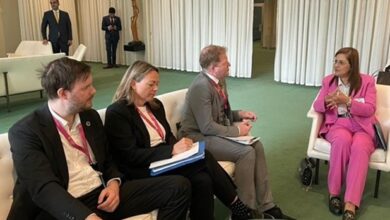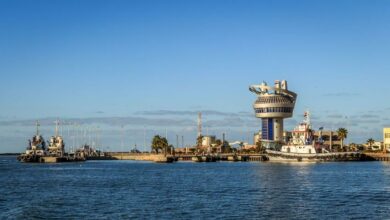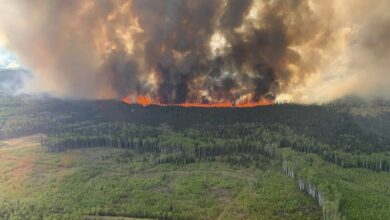OSLO, Norway – Days after a huge car bomb shattered government buildings in central Oslo and a gunman opened fire on youths attending a summer camp 30km away, Norway mourned its victims but vowed not to bow to fears over national security.
At least 93 people are dead following Friday's twin attacks and nearly 100 more have been injured while a handful of others remain missing. Oslo police have arrested Norwegian national Anders Behring Breivik for the crime and charged him with committing acts of terrorism.
Through his lawyer, the 32-year-old Oslo resident confessed to the attacks, calling them "gruesome” but “necessary".
Investigators allege Breivik detonated the car bomb that claimed seven lives shortly before 3:30 Friday and then drove west to the island of Utoeya, where the ruling Norwegian Labor party was hosting its annual youth camp. Once on the island, Breivik donned a police sweater, deceiving people into thinking he was an officer.
He then peppered the island with gunfire from a pistol and an automatic weapon, killing roughly 86 campers and sending others scurrying to safety. Breivik eventually surrendered peacefully though police said there was still ammunition left in his weapons.
Many in the capital are still in a state of shock over the coordinated attacks. Norway is a quiet nation of less than five million and its citizens had few fears of terrorism, particularly of attacks committed by Norwegians.
“We are still struggling to take in the scale of this tragedy. Many of us know someone who has been lost. Even more know of someone,” said Prime Minister Jens Stoltenberg at a memorial ceremony in Oslo today. “I knew several.”
Before the ceremony, Stoltenberg and King Harald V of Norway each laid a single white rose outside the Oslo Cathedral while mourners wiped away tears and queued to enter the packed church.
Norwegian leaders underscored the need of the nation to remain united during the time of crisis. They also said the terrorist attacks would not transform the country’s policies of tolerance or lenient security measures.
“The Norway that you meet tomorrow will be recognizable. We will stand up for the values that made the island Utoeya possible,” Jonas Gahr Store, the foreign affairs minister, said this weekend. “The youth of Norway will take Utoeya back and we will help them in doing so.”
The streets of Oslo remained crowded on Sunday as Norwegians and tourists sipped coffee and smoke cigarettes at sidewalk cafes. Yet there was no missing the fact that the tragedies weighed on most people’s minds.
“It’s very quiet and everyone is looking at the TV, newspaper and talking about what happened,” said Grethe Fotland, who was in town visiting from her home just outside of Bergen, Norway’s second largest city.
She said she knew of two people from her town that were still missing and three more who were wounded in the attacks. While in town, her family passed along the police cordon around downtown Oslo as investigators combed through the debris and cleaned up the damage.
“It’s like a war movie,” the 41-year-old said of the soldiers posted at the intersection leading to the blast site. “It’s very unreal.”
Initially, speculation focused on Islamic extremists as perpetrators of the huge bombing. Terrorism experts quoted in the Norwegian media said the explosion and its target had the all the hallmarks of an Al-Qaeda attack. That assumption was quickly dropped, however, once police arrested Breivik.
“It’s a general trend in Europe and all over the world. These kind of attacks are symbolized with Islam,” said Oslo resident Ali Syed moments after laying flowers at a growing memorial outside of the cathedral.
The 27-year-old son of Pakistani immigrant said he was not surprised by the anti-Islamic rhetoric that Breivik expressed but hoped it would sour people’s taste for such talk in light of the attacks carried out on Friday.
“People are getting scared of Islam and this kind of hatred is building up in them,” he said. “We need to unite as a society, as a Norwegian people. We need to fight against this kind of ideology.”
Others in Oslo privately breathed a sigh of relief after hearing the accused bomber and gunman was Norwegian. Several residents said if a Muslim committed the crimes the backlash would be much greater and would embolden the extreme and xenophobic right.
Norway’s second-largest political party in parliament, the Progress Party, has been accused of harboring xenophobic positions. Breivik joined the organization in 1999 and paid his last membership fee in 2004, according to a statement posted on the party’s website. He was deleted from the member registry in 2006 and the Progress Party has condemned the attacks.
In neighboring Sweden, the far-right Sweden Democrats gained their first seats in parliament following national elections in September. The party has urged massive reductions in immigration levels and has called Islam “un-Swedish.” The Finnish parliamentary election in April ushered in the True Finns party, another nationalistic party hostile to immigration.
Though no motive has been detailed, the media has zeroed in on Breivik’s far-right viewpoints as his reasoning behind the attacks. He has been described as a fundamentalist Christian and a gun lover greatly troubled by the rise of Islam and “cultural Marxism” in Europe.
In a 1500-page manifesto written under a pseudonym and posted online, Breivik bemoans the European loss of identity and urges readers to translate and distribute the manuscript online.
“This irrational fear of nationalistic doctrines is preventing us from stopping our own national/cultural suicide as the Islamic colonization is increasing annually. This book presents the only solutions to our current problems,” the document reads.
Breivik also posted a video online, echoing such viewpoints. In the final seconds of the film, a picture appears of the 32-year-old aiming a rifle with a stoic expression.




